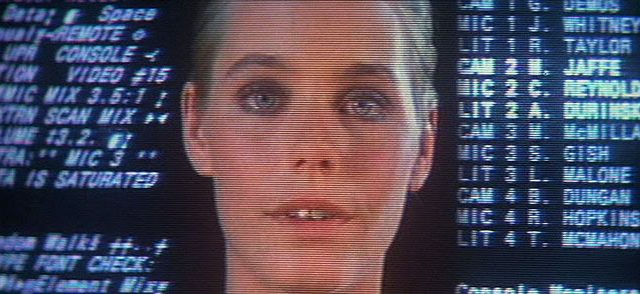Michael Crichton’s sci-fi techno-thriller Looker is an odd beast. It’s a 1981 film that makes some spot-on predictions about CGI, advertising research, and digital recreations of actors; it also has Village of the Damned-style silver eyes that indicate a blast of weaponized hypnotism. Sometimes it’s good, with a slickly unnerving paranoid thriller vibe, and sometimes it’s just ridiculous. Sometimes it’s good when it’s ridiculous, as when Crichton stages a don’t-think-about-it-too-hard fight scene that involves Albert Finney and Tim Rossovich chasing each other through the sets for digitally generated commercials. Even at its worst, it has Albert Finney and (an under-used) James Coburn.
There are, however, great whacks of it that don’t make sense. The story kicks into gear when Dr. Larry Roberts (Finney), a skilled plastic surgeon, finds out that a number of his former patients–all gorgeous models and actresses who came to him with printed-out lists of how to adjust their proportions down to the millimeter–have been dropping dead at an alarming rate. Could be accidents, could be suicides, but it’s suspicious, and Roberts is at the center of it all. As the prime suspect in this series of uncanny stalk-and-kill cases, Roberts is motivated to investigate on his own. Aided by Cindy Fairmont (Susan Dey), who would seem to be next on the kill list, he pokes around and discovers that a sinister research company is analyzing models’ and actresses’ features, apparently in the service of creating “perfect” digital duplicates.
It’s a good setup, but Crichton can’t decide what story he’s telling. The result is a pile-up of half-baked ideas about inhuman beauty standards, the future of art and advertising, subliminal messaging, and corporate involvement in politics. When this works, it gives the film an offbeat richness, with the speculation taking on different meanings from different angles … but it works less and less as the movie goes on. The mystery plot also drops away completely, to the point where I’m still not sure why the culprits wanted to kill the “perfected” models. Honestly, if they hadn’t started racking up a body count for no apparent reason, their whole plan could have gone off without a hitch.
Despite its faults, Looker is interesting–rough and weird and intermittently atmospheric. It’s ambitious if half-assed, and it offers bizarrely catchy theme song and an intriguingly cockeyed view of a future that’s now become our present. That’s definitely enough reason to pick it up one night.
Looker is streaming on Tubi.


